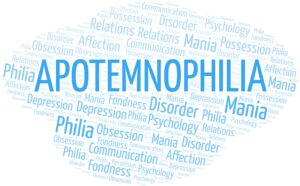Thankfully, decades of awareness efforts have increased compassion and reduced stigma toward people who have anxiety, depression, and many other mental health concerns. However, individuals who have rare or complex mental health needs often do not receive the same level of understanding. In today’s post, we discuss a serious mental illness that many people have likely never heard of: apotemnophilia.
What is Apotemnophilia?
 The term “apotemnophilia” was coined by John Money, PhD, who was the lead author of a May 1977 article in The Journal of Sex Research about this condition. Most experts point to Money’s article as the first modern scientific publication about apotemnophilia.
The term “apotemnophilia” was coined by John Money, PhD, who was the lead author of a May 1977 article in The Journal of Sex Research about this condition. Most experts point to Money’s article as the first modern scientific publication about apotemnophilia.
Apotemnophilia does not appear in the fifth edition of the Diagnostic and Statistical Manual of Mental Disorders (DSM-5), which is the standard reference book for clinicians in the United States. Exclusion from the DSM-5 does not mean that this disorder isn’t a “real” condition – but it can lead to some debate regarding the exact definition of apotemnophilia.
Here is how apotemnophilia has been defined by various sources through the years:
- In his initial 1977 article on the topic, John Money called apotemnophilia “self-demand amputation [that] is related to erotization of the stump and to overachievement despite a handicap.” Money also introduced his article with a reference to “the relationship between sexual attraction and amputated limbs.”
- A September 2001 article in the AMA Journal of Ethics referred to apotemnophilia as “an attraction to the idea of being an amputee.”
- A January 2021 overview of the condition in the Yenagoa Medical Journal described apotemnophilia as “a syndrome or symptom complex in which an otherwise sane person is preoccupied with a strong desire to amputate a healthy body part.”
These and other experts agree that the definition of apotemnophilia should involve a desire to remove a healthy body part. However, Money’s inclusion of a sexual or erotic component in his description of the disorder is not as widely accepted.
For example, in a July 2014 review in the journal Neuropsychiatric Disease and Treatment, co-authors Anna Sedda, PhD, and Gabriella Bottini, PhD, reported that recent studies on apotemnophilia “are grounded on the idea that the desire might originate from body representation impairments, rather than from a sexual compulsion.”
What Causes Apotemnophilia?
As indicated by the quote at the end of the previous section, mental health experts have yet to identify a conclusive cause for apotemnophilia. While some continue to view this condition through the lens of sexual attraction, others are now approaching the topic from different perspective.
This lack of universal agreement regarding the possible causes of apotemnophilia extends to the name of the condition itself. While “apotemnophilia” remains the consensus term for now, the “philia” ending (and its connection to paraphilia, or intense sexual impulses) has led some experts to suggest alternative terminology.
Sedda’s and Bottini’s July 14 review addresses this concern, noting that the following two alternative terms have gained some traction among mental health researchers:
- Body Integrity Identity Disorder (BIID): This term was originally proposed in 2005 as an acknowledgement that the desire to amputate a healthy limb is more closely related to identity than sexual desire.
- Xenomelia: First suggested in a 2011 research paper, this term combines the Greek words “xeno” (or foreign) and “melia” (limb).
Michael B. First, MD, who advocated for BIID in an article in the journal Psychological Medicine, based his preference for this term on telephone interviews he conducted with 52 people who wished to have a healthy limb amputated.
“The most common reported reason for wanting an amputation was the subject’s feeling that it would correct a mismatch between the person’s anatomy and sense of his or her ‘true’ self (identity),” First wrote.
Dangers of Apotemnophilia Syndrome
Nine of the 52 people that First interviewed had an undesired limb amputated. However, underscoring the danger of this condition, only three of these individuals underwent a safe surgical procedure. The other three, he noted, used “methods that put the subject at risk of death.”
Though it is perhaps the most obvious indicator of the danger associated with apotemnophilia, attempted self-amputations are not the only sign of the distress that this disorder can cause.
In the Yenagoa Medical Journal article that we linked to earlier in this post, authors Oluwadara Tomisin Akano and Ifeoluwa Oduguwa reported that individuals who have apotemnophilia also exhibit disrupted occupational and social functioning, as well as “pretentious acts of being disabled.”
Akano and Oduguwa also observed that people who have this disorder are aware that their impulses would likely cause them to be stigmatized. This can lead to a sense of isolation that could prompt the onset or exacerbation of other mental health concerns.
Is There Treatment for Apotemnophilia?
People who have apotemnophilia may be treated with a combination of medication, therapy, and/or certain medical procedures.
Akano and Oduguwa cited two studies that suggested the antidepressant fluoxetine (Prozac) and the benzodiazepine oxazepam may be helpful at alleviating some of the distress that is associated with this condition.
Research into therapy for apotemnophilia indicates that cognitive behavioral therapy (CBT) may be beneficial at helping people manage their urges, but it does not appear to reduce the desire to have a limb removed.
In a 2007 article in the journal Medical Hypotheses, co-authors V.S. Ramachadran, PhD, and Paul McGeoch, MD, suggested that a medical technique called cold-water vestibular caloric stimulation may be a promising treatment. This procedure involves using water to stimulate nerves within the inner ear.
Tamachadran and McGeoch based this suggestion on what they saw as a relationship between apotemnophilia and somatoparaphrenia (a delusional belief, often caused by stroke, that a person’s left-side body parts do not belong to them).
Finally, though it is extreme (and controversial), research indicates that people with apotemnophilia who undergo surgery to amputate an undesired body part do not experience continued emotional distress in the aftermath of the operation.
Contact Montare at the Valley About Mental Health Treatment
If someone in your life has been exhibiting symptoms of apotemnophilia, delusional beliefs, or other complex mental health concerns, Montare at the Valley is here to help. Our team can assess the full scope of your loved one’s needs and determine an ideal course of treatment.
To learn more about our services and programs, or to schedule a free assessment, please visit our Contact Us page or call our center today.


Recent Comments